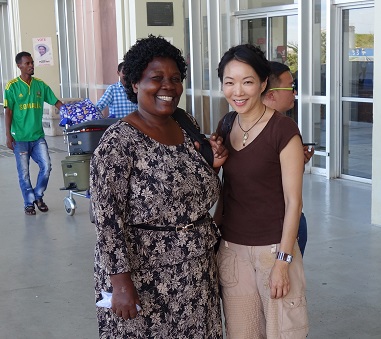
By Patricia Caso/April 22, 2018
In Garden of the Lost and Abandoned: An Extraordinary Story of One Ordinary Woman and the Children She Saves, author Jessica Yu follows heroic Ugandan journalist, Gladys Kalibbala, who uses her energy, creativity and meager resources to rescue lost and abandoned children.
Her column, “Lost and Abandoned,” has drawn attention to the plight of hundreds of forsaken children. Gladys routinely faces many difficult and dangerous situations to help them.
“What Gladys does is hard. But the cumulative impact of her deliberate – not random – acts of kindness, and the joy she takes in them, reminds us that we discover our humanity when we engage. And if we persist, things happen.” Jessica Yu
Intrigued with Gladys’ life-saving deeds, I began researching more about her life and discovered Jessica Yu’s own multi-faceted story. Not only was she an award-winning director in television, documentaries and films, she’d just written her first book, Garden of the Lost and Abandoned. And, what a compelling changemaker Jessica brings to readers.
I caught up with this Academy Award-winning filmmaker in Los Angeles by phone in between her busy commitments to find out more about Gladys’ exceptional acts and Jessica’s perspective on her own career…
Book trailer
EYE: You featured Gladys Kalibbala in your film, Misconception, a documentary about population issues. Having made many notable films on a variety of people before meeting Gladys, what triggered the idea to write a book about her?
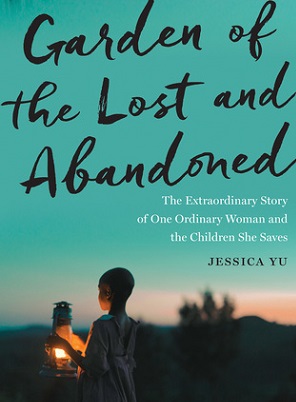
JESSICA: I wanted to understand what makes her tick and to be closer to it. In making the film, we were only able to follow her for a few days.
It just seemed strange to be leaving after about a week or two, so I was thinking about ways to explore this story. That’s when I thought I should pursue writing a book about her.
In Uganda there are many reasons for children being lost like illness, poverty, misfortune or the simple separation from family. I was impressed by the fact that Gladys was rescuing so many children on her own. She doesn’t have money, transportation or the backing of an NGO. But over the years she has taken on hundreds of these cases.
That was striking to me. At the same time, she is this cheerful, buoyant personality, who is larger than life. It’s not Polyannaish. She clearly takes joy in the effort in solving these intractable complex problems having to do with individual human beings.
EYE: I found Gladys’ compassionate but steely focus fascinating. What do you hope readers will appreciate most about Gladys?
JESSICA: I hope people come away from the book with an appreciation for what I’ve come to see as Gladys’s optimistic pragmatism – the notion that any positive step has value. Helping individuals can be a messy, complex, no-end-in-sight proposition.
But Gladys shows us how quickly a person’s fortune can change with even a modest intervention. I’ve seen her travel a whole day for a ten-minute visit, just to let a child know that she is still involved. That kind of personal contact can brighten a child’s view of the world.
What Gladys does is hard. But the cumulative impact of her deliberate – not random – acts of kindness, and the joy she takes in them reminds us that we discover our humanity when we engage. And, if we persist, things happen.
EYE: Many of the lost children’s stories are gut-wrenching. Did you ever want to be personally involved?
JESSICA: Of course! When Gladys interviewed a young mom whose child had to drop out of school for want of a few dollars, it was not easy to be a passive observer.
I might provide for our travel and miscellaneous expenses related to my visits, but I could not step in and try to save the day. Gladys understood that as well. The book had to describe the reality she faces everyday.
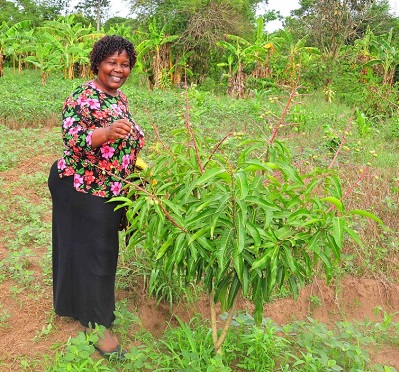
EYE: Gladys has been described as “hard-nosed and warm-hearted.” What do you see in Gladys that makes her so focused, determined and persistent?
JESSICA: Gladys took on a lot of responsibility at a young age. She was the firstborn in a family of eight children. Her father had children by more than one woman. He drank and her parents often fought.
For several years, Gladys was sent to live with her grandparents. Happily her grandparents were loving and generous, the kind of people who opened their house to others. If someone needed a meal, there was always room at the table.
EYE: But it got tougher than that…
JESSICA: When Gladys was 17, her grandfather died, and Gladys was left in charge of her younger siblings. She had leave school to work, but she did not hesitate. I think those years with her grandparents gave her a grounding for the way things could be, for how we should treat each other. You could always make room at the table.
That said, she is a resourceful and creative thinker, naturally drawn to problem solving. She finds much joy in applying her skills, experience and energy to helping others.
EYE: How do you think Gladys sees herself?
JESSICA: She has told me that it was just how she was made! She doesn’t consider her altruistic bent extraordinary. To her it’s just common decency.
EYE: How does Gladys support herself?
JESSICA: Along side her work with all the cases of these kids, she realizes that she needs some way to sustain her work. She has to knock on doors, trying to scramble her way to help each one of these kids.
She doesn’t have a lot of money. She doesn’t always have something she can bring to the problem in a concrete way. She is, however, so creative, so persistent, that she comes up with little solutions everywhere. She took out a loan against her meager earnings at the paper to buy a small plot of land.
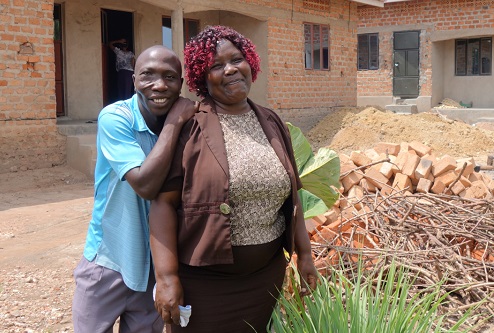
EYE: Why would Gladys want to buy a plot of land?
JESSICA: She wanted to start a farming concern, or garden, to raise money for her expanding efforts. That is why I titled the book Garden of the Lost and Abandoned. Gladys is trying to get this project off the ground.
It is a source of incredible drama, way more drama than I thought it would be. From droughts to theft to family betrayals, Gladys found she was the one needing help.
I thought the garden would be about the kids and her work in the field. The children are on a school break now, up to two months long, and if you don’t have family to go to, it’s very difficult. Some stay over at the garden and help out. They love it because it really feels like it’s their place.
EYE: So what’s more rewarding for you, writing a book or directing?
JESSICA: It’s different. The thing I savored in writing the book was the opportunity to follow a story without any crew, equipment or schedule. There is a different kind of focus – an intense focus – that you can achieve when you don’t have worry about all those other things.
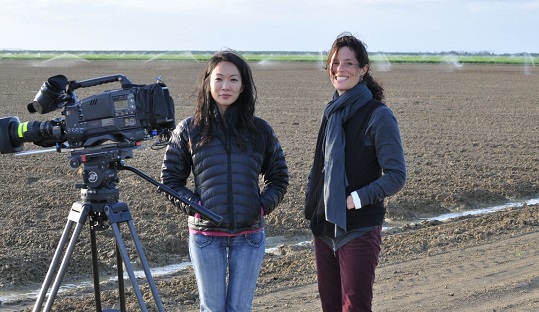
When you make a documentary, there is this goal of being unobtrusive; you are a fly on the wall. It’s an unattainable goal because you always have to worry about technical things like moving cameras around when the sun is overhead or feeding the crew.
When you are with Gladys, by the way, you don’t eat all day. It’s go, go, go! With Gladys, like a lot of people in her life, I ended up trailing her in her wake and trying to absorb things as they were happening. I loved the immediacy of that and just the ability to deeply watch.
Jessica on Social Action and Filmmaking
Center for Media and Social Impact
EYE: I was fascinated with your unusual path to directing. You were an accomplished fencer at Yale University, competing on the U.S. team at the World Championships after college. Looking for employment with flexible hours to make extra money you took a job on a small film.
Fast forward a few years and you are a successful director with an Oscar to boot! You are known for your wide range of subjects. You have been called “eclectic” and “humanity-driven.” How would you describe yourself?
JESSICA: (laughs) I’m terrible at describing me. I always feel like that there is something external that pulls me into a certain direction. An example is meeting Gladys. That was not something I planned or had looked forward to in pursuing a story.
I think some of the documentaries I worked on depict somebody who has somehow gone against the grain, created an alternate universe for themselves or discovered a different approach to their situation in order to satisfy some human need.
I like the fact there is always some universal human impulse there. That was certainly the case with writing about Gladys in the book. There was something about her voice in my head that I thought this makes sense. I can do this.
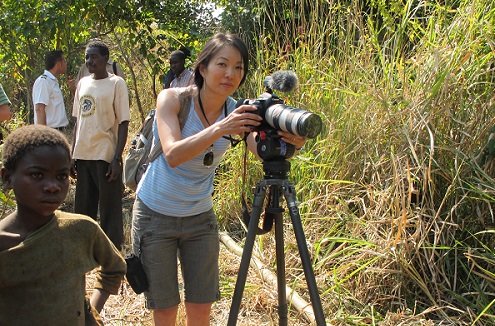
EYE: What was your beginning experience like as a director?
JESSICA: When I worked my first directing episodic, The West Wing, it was through John Wells Productions. They invited me to observe and then gave me my first shot. My great motivator was fear.
There were so few women directors and there are still so few women working in that capacity. I felt like, “Oh, I better not blow it because then they’ll never let anyone else do this.” There were a few women I met but the numbers were so low.
In fact, on my first day to direct the episode, there was a parking space right next to the stage that said “Director” on it. I parked there. An elderly security guard came out and said, “Oh, honey, I’m sorry but that space is for the director.” I said, “I know. This is weird for me, too.” (laughter)
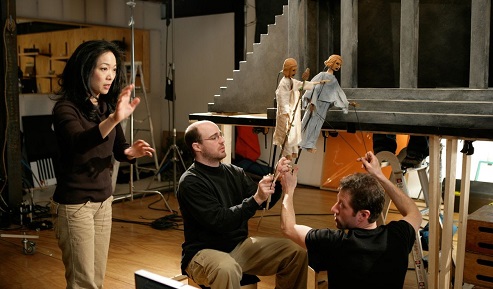
EYE: With #MeToo and the Times Up Movement, etc. what do you think it will take to achieve the equality and respect that women deserve?
JESSICA: I think this is a national conversation. Companies and people taking a stand can move this forward. Acting or not acting makes a statement. There are certainly more conversations on the sets.
It is important to recognize how prevalent this culture has been. Despite backlash and some resistance, the pendulum is swinging. I really feel there is going to be real change. This is how change happens; it will always be a bit messy.
EYE: On a totally different note, did you ever imagine that you would be standing on a national television stage accepting an Oscar for Breathing Lessons: The Life and Work of Mark O’Brien and be such a successful director?
JESSICA: No. Definitely not. Someone asked me a long time ago where I wanted to be in ten years. I said, “I basically would like to be doing what I was doing, but maybe not driving the exact same car.”
I feel like I’ve been able to have projects where I feel deeply about them or I am committed to seeing them through or they are deeply satisfying. In that I feel lucky.
We are all trying to figure out how to sustain ourselves professionally, but we also have something that roots us and gives us the reason to do it in the first place. Having meaningful stories on one front or another is vital.
EYE: Jessica, thank you so much for introducing us to Gladys. Continued success in all your meaningful pursuits and we’ll look for more of your work in theatres and television. For more information about Gladys’ cause, please go to youcaring.com.
###


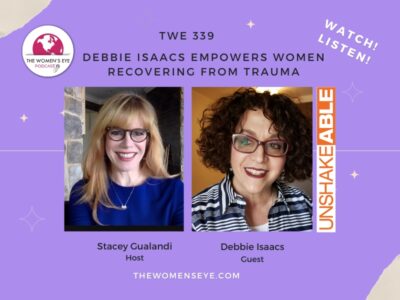
Leave a Reply